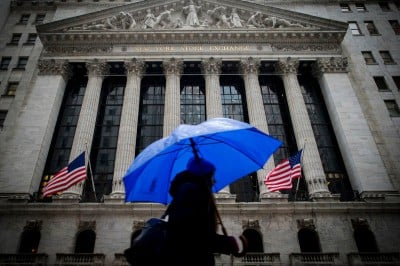 © Reuters. BIRK -12.61% Add to/Remove from Watchlist Add to Watchlist Add Position
© Reuters. BIRK -12.61% Add to/Remove from Watchlist Add to Watchlist Add Position Position added successfully to:
+ Add another position Close
Investing.com -- U.S. stock futures inch higher, as markets prepared for all-important September consumer price data that could influence how the Federal Reserve approaches future interest rate decisions. Minutes from the Fed's meeting last month showed caution among policymakers, although some officials are now wondering if a weeks-long surge in U.S. Treasury yields has tightened financial conditions for them. Elsewhere, Steve Scalise is nominated by his Republican colleagues as the new House Speaker, as the lower chamber of Congress remains at a standstill despite facing a host of major legislative questions.
1. CPI ahead
The latest U.S. consumer price index (CPI) is set to be published on Thursday, with the monthly insight into the pace of inflation in the world's largest economy likely to factor into future Federal Reserve policy choices.
Economists expect September's headline CPI reading to slow on an annual basis to 3.6% from 3.7%. Month-on-month, the figure is seen decelerating to 0.3% from 0.6%.
Particular attention will likely be dedicated to the core number, which strips out volatile items like food and energy. The monthly underlying rate is projected to stay unchanged at 0.3% and ease down to 4.1% year-on-year.
However, upside risks remain. On Wednesday, producer inflation data for last month was much stronger than anticipated, fueled in particular by a rise in gasoline prices.
2. Futures higher as key inflation data looms
U.S. stock futures edged up on Thursday as investors awaited the release of the consumer price figures.
At 04:50 ET (08:50 GMT), the Dow futures contract had added 71 points or 0.2%, S&P 500 futures had risen by 12 points or 0.3%, and Nasdaq 100 futures climbed by 45 points or 0.3%.
The main indices on Wall Street ended the previous session in the green, buoyed in part by minutes from the Federal Reserve's September meeting which showed that officials were keen to take a cautious approach to further hikes to borrowing costs (more below). The commentary helped bolster hopes that rates would remain steady in the short term.
Also supporting stocks was a drop in U.S. Treasury yields to about a two-week low, as more capital streams into safe havens following the escalation of hostilities in the Middle East. Prices typically move inversely to yields.
In corporate news, a slide in German sandal maker Birkenstock's (NYSE:BIRK) shares in its first trading day on the New York Stock Exchange somewhat dampened the mood in equity markets.
Traders will be on the lookout for a fresh batch of company results from Delta Air Lines (NYSE:DAL) and Walgreens Boots Alliance (NASDAQ:WBA) on Thursday, as the gears of the quarterly earnings season begin to churn.
3. Fed flags cautious approach in September minutes
Fed policymakers agreed that the world's most influential central bank should "proceed carefully" on upcoming interest rate decisions, minutes from their September meeting showed.
Officials flagged that they were wrangling with two main risks: not tightening policy enough to curb elevated inflation and lifting rates to such a height that it impacts broader domestic economic activity.
But, crucially, the minutes reflect the viewpoints of Fed members prior to a recent spike in U.S. Treasury yields.
Officials have since suggested that this jump may now need to be considered ahead of any future rate choices. Indeed, at an event on Wednesday, Fed Governor Christopher Waller posited that the run-up in yields may have in effect done "some of the work" of tightening financial conditions for policymakers. Several other officials have echoed this sentiment throughout this week.
4. Crude volatile amid large U.S. stocks build
Oil prices edged higher in choppy trading Thursday, attempting to rebound after dropping in the previous session, as data showing a hefty rise in U.S. crude stocks last week raised concerns about demand in the world's largest crude consumer.
U.S. crude oil stockpiles swelled by just under 13 million barrels, according to numbers from the industry body American Petroleum Institute. If confirmed by the official figures from the Energy Information Administration later in the session, it would be the biggest weekly crude stockpile build in eight months.
Gasoline inventories also jumped by 3.6 million barrels, compared with the 800,000-barrel drop expected, adding to worries that the end of the driving session in the U.S. has resulted in a sharp dropoff in demand.
By 04:51 ET, the U.S. crude futures traded 0.7% higher at $84.04 a barrel, while the Brent contract increased 0.9% to $86.62 per barrel.
5. House Republicans nominate Steve Scalise for Speaker
Steve Scalise has won the nomination from his Republican colleagues to become the next Speaker of the U.S. House of Representatives, but he still needs backing from some hardline party members to secure the position.
In a ballot among House Republicans on Wednesday, the Louisiana congressman beat House judiciary committee chair Jim Jordan by a tally of 113-99.
Scalise now faces a vote in the full Republican-controlled House, although a number of far-right GOP legislators in the lower chamber of Congress told reporters that he had not yet earned their support.
It is still unclear when the vote to replace Kevin McCarthy, who was ousted as Speaker following a Republican revolt last week, will take place. The House has been unable to pass legislation since McCarthy's departure, leaving key questions unresolved around a stopgap spending bill set to expire next month as well as additional U.S. support for Israel and Ukraine.
CPI looms, Fed flags caution around future rate decisions - what's moving markets 4


